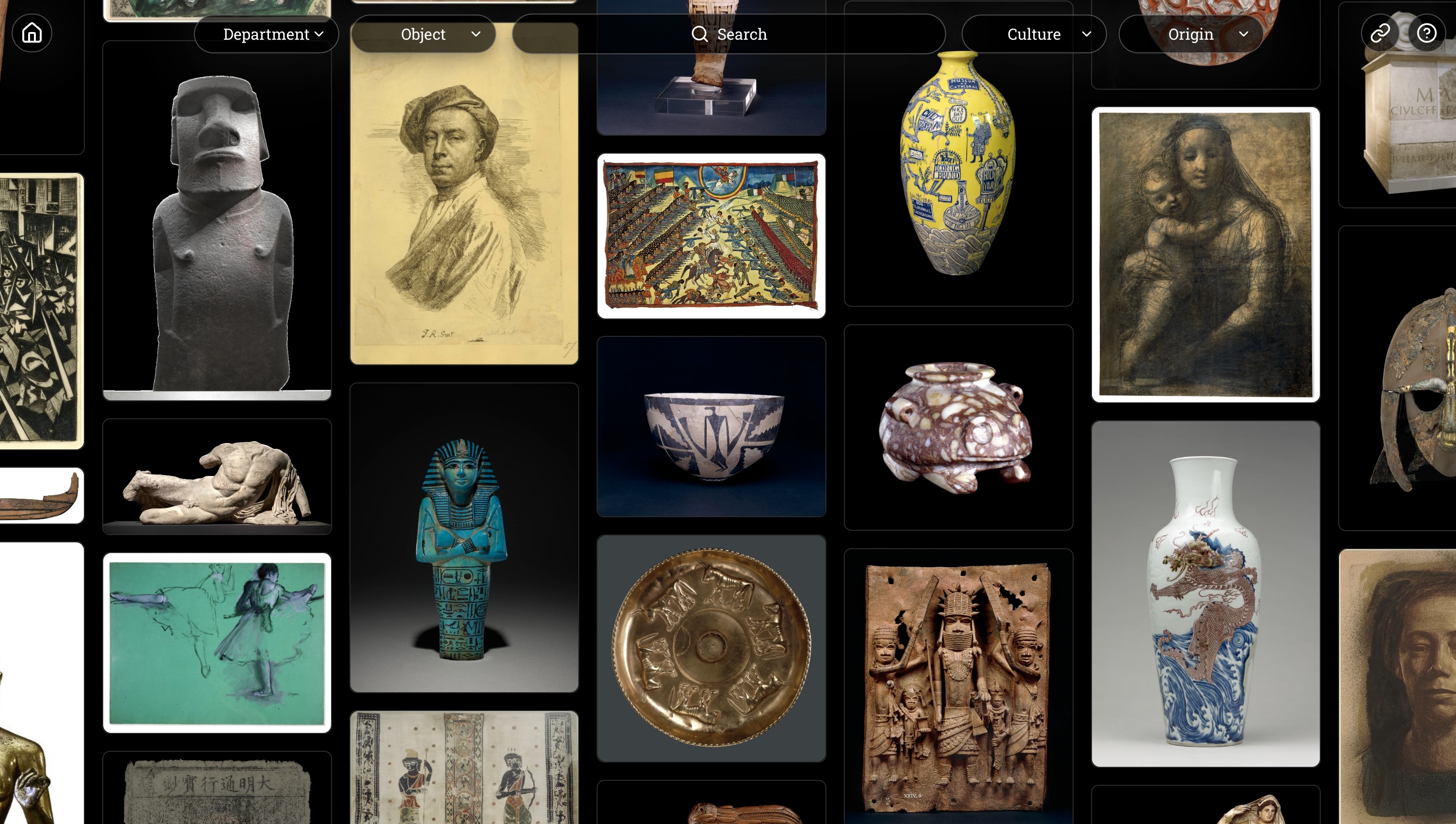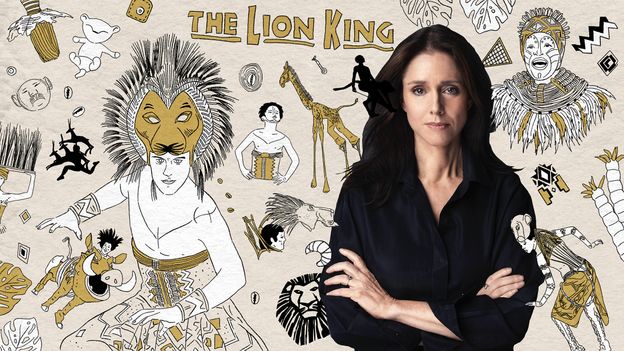This week's best things
A new way of exploring the British Museum's collections data, the impact of digital poverty, more issues with Google's AI search results, Netflix insights, the story behind the Lion King, how people use ChatGPT, misinformation, Radiohead, and a children's choir singing a Björk song

The Living Museum
"Imagine a museum where artifacts come to life. What would you say to them? Would you inquire about their origins, or what life was like back then? Or would you simply stop and listen to their stories?"
A new AI-driven platform that uses the open data available from the British Museum's collection to enable users to navigate the collection using natural language terms (e.g. clothing from China" or "life in the times of the pharaohs") and, perhaps most controversially/interestingly, have 'conversations' with the objects about their history, purpose, etc.
It has already generated a few...conversation-worthy responses.
I spotted this via the Museum Computer Group list wherein the creator made it clear that "there was no dialogue with the BM team during the development of the Living Museum. I used their publicly available dataset under the non-commercial creative commons license."
Generally the sector response to this so far has either been "I hate this" or "this is cool". Mostly the former.
On this topic there have been a couple of other recent examples of museums using AI tools themselves. This article from MuseumNext looks at how the National Museum of the Royal Navy is using AI to change how it "manages, preserves, and makes its collections accessible", and this post from the London Museum's Trish Thomas describes how they are using AI to "power content relationships".

‘I felt I had no choice’: why Deborah did her schoolwork using the shopping centre wifi
This Guardian article highlights the very real impact around lack of internet access and in doing so also speaks to the importance of libraries, and digital inclusion.
"According to the latest Australian Digital Inclusion Index (ADII), almost a quarter of Australians are digitally excluded – meaning they have don’t have access to essential technology, such as fast and reliable internet and digital devices.
The chief executive of the Smith Family, Doug Taylor, says about 10 million laptops, tablets and PCs have been refreshed by corporate bodies and governments in the past five years. If they were recycled, 10 million students could benefit.
“Digital poverty is the new frontier of how people experience poverty,” Taylor says. “It’s a barrier over and above access.”
The device bank would not be without precedent. Since 1993, the Canadian government has refurbished and distributed almost two million digital devices as part of a Computers for Schools program designed to reduce electronic waste and improve the digital skills of young people."
This is a good time to re-share Promising Trouble's recent paper "Digital Inclusion for 2024 and Beyond".
Google shuffles the search deck
Following on from the article I shared last week that highlighted some of the (many) failings of Google's AI-powered search results, Casey Newton's latest edition of his Platformer newsletter asks "can the company [Google] hit the reset button?".
Yet another slightly strange, AI-driven search result went viral this week (this time Google was conflating wound and salad dressings as one and the same) "by this afternoon, the issue had been fixed — all references to wounds had been removed from the search. It’s a minor mistake — no one was harmed in the making of this sauce — and yet it speaks to the issues that have dogged Google’s search and AI product teams all year. In May, the company told us that in the future Googling would do the Googling for us. But Google’s erratic output this year has left many of us reluctant to hand it the keys."

Netflix says subscribers spend two hours a day on the platform
Last week I shared a piece which looked at the 'endless' nature of Netflix's content library, and this week Netflix's earnings report contains information which would appear to validate that approach.
"Subscribers spend an average of two hours each day using the platform, while household viewership increased compared to last year"
This is perhaps another useful reminder that your main competition for most things in 2024 is the lure of the sofa.
/cdn.vox-cdn.com/uploads/chorus_asset/file/23951362/STK072_VRG_Illo_N_Barclay_5_netflix.jpg)
'I got major doubt from the movie guys': Julie Taymor on turning The Lion King into the most successful musical ever
A good read from the BBC looking at the story behind the Lion King musical, which is "the highest-grossing production of all time, in theatre or in film, taking over $10 billion (£7.68 billion) worldwide. It's currently celebrating 25 years in the West End, hits 27 years on Broadway next month, and has been staged all around the world – from South Africa to South Korea, Australia to the United Arab Emirates – visiting every continent except Antarctica."

What kind of writer is ChatGPT
An interesting piece in The New Yorker that looks at how people are using ChatGPT.
Rather than too much hand-wringing about whether or not using tools like ChatGPT is 'cheating' this piece instead looks at the many different ways that writers use tools of all kinds to help their process of writing, and explores how ChatGPT et al fits into that continuum.
"Last year, Stacey Pigg, a communications professor at North Carolina State University, systematically studied thirty-five YouTube and TikTok videos in which people used generative A.I. to help craft research papers.
Pigg partitioned the videos into short segments, each of which captured a single digital interaction that she could label and categorize. Pigg ultimately identified forty-four things that writers had asked ChatGPT to do, such as rewording findings for a lay audience or evaluating the quality of citations. Some of these activities—asking the model to craft a conclusion section from scratch, say—could be considered cheating, but most were harder to categorize.
Writing with A.I. was not a “coherent or stable phenomenon,” she wrote. “Instead, the study suggests disparate, fragmented uses of generative AI technologies.” [...]
For the writers Pigg studied and the students I interviewed for this article, ChatGPT was not so much a perfect plagiarism tool as a sounding board.
The chatbot couldn’t produce large sections of usable text, but it could explore ideas, sharpen existing prose, or provide rough text for the student to polish. It allowed writers to play with their own words and ideas. In some cases, these interactions with ChatGPT seem almost parasocial"

Elizabeth Goodspeed on the new battleground of political swag
This article is a fascinating deep dive into the (very American) phenomenon of political campaign merch.
"Once limited to official channels, political merch now functions as a lasting form of personal expression; voters wear it to signal something about themselves, not just the candidate. [...]
As in fashion, where polished branded merch has sparked bootleg alternatives, DIY Kamala merch offers voters something that feels more personal and expressive, rather than just slick campaign propaganda. Where candidates can’t (or won’t) push boundaries, independent creators step in, filling the gap with more meaningful designs that reflect real voter engagement."

Stop drinking from the toilet
This piece from Judy Estrin is a useful (re)framing of how we could be thinking about misinformation, digital safety, platform ethics, and more.
"Today, digital services have become the information pipes of our lives. Many of us do not understand or care how they work. Like water, digital information can have varying levels of drinkability and toxicity–yet we don’t know what we are drinking.
Current system designs are corroded by the transactional business models of companies that neither have our best interests in mind, nor the tools that can adequately detect impurities and sound the alarm. Digital platforms, such as Instagram, TikTok, or YouTube, don’t differentiate between types of content coming into their systems and they lack the equivalent of effective water filters, purification systems, or valves to stop pollution and flooding.
We are both the consumers and the sources of this ‘digital water’ flowing through and shaping our minds and lives. Whether we want to learn, laugh, share, or zone-out, we open our phones and drink from that well. The data we generate fuels increasingly dangerous ad targeting and surveillance of our online movements. Reality, entertainment, satire, facts, opinion, and misinformation all blend together in our feeds. "

King of Gear
I like Radiohead, but this website takes nerdy fandom to a whole other level.
This blog is dedicated to detailing (in a LOT of detail) the equipment that Radiohead use to record and perform (it also covers all of their various side projects).
It's obviously a niche-interest thing, but this sort of site is what makes the internet wonderful, so well done them.

This week's consumption
I read The Flat Share by Beth O'Leary (which our friend Rose wrote the tv adaptation of) which was a nice hug of a read.
I've started reading A Psalm for the Wild Built by Becky Chambers.
We watched Will & Harper (Netflix) which was wonderful. Strong recommendation for anyone who likes road movies, friendship, self-discovery, and the heartlands of America. This from the Guardian review is a good summary "Ferrell and the comedy writer Harper Steele have been friends for decades but since she transitioned, they haven’t spent a great deal of time together. Both have wondered how to handle what their friendship now is, whether major changes are needed, how to act, what to ask, what not to ask, etc. Steele, living in upstate New York but born in Iowa, is also curious about how her life plays out now outside of her comfort zone, how difficult things might be for her in states where both legally and socially, she is considered less of a human. Her body has changed but her tastes haven’t – she likes shitty beer and sport and dodgy bars and doesn’t want to feel like she can’t be herself in places she used to frequent."
We started, and finished, season 3 of Industry (BBC iPlayer/HBO), which was very good (even though, or perhaps because, every character in it is a deeply awful person).
Episode 5 of Industry featured a track by Brian Eno and Fred Again which I really enjoyed, it's called Cmon and is from the (otherwise extremely mixed) album, Secret Life that they put out last year.
I also really enjoyed the latest album from Godspeed You! Black Emperor, No Title as of 13 February 2024 28,340 Dead. It is, despite the title, cathartic and very beautiful. The Pitchfork review said "as the world’s doom spiral has accelerated, Godspeed have responded with the most elating music in their canon".
And finally, here's a New York children's choir (PS22) singing Jóga by Björk (it's very good).








